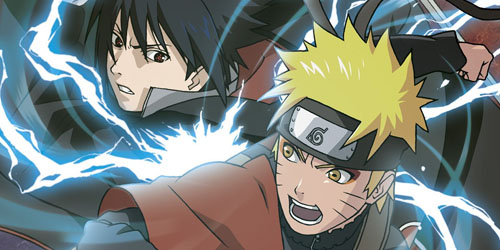Last updated on February 8, 2013
Monday Update and witticisms. Yeah! Take that!
Naruto Shippuden Ultimate Ninja Storm 2 – So podcast man Joe let me borrow this game. He got NieR. Since Joe likes this game a heck of a lot (and, apparently, played it with friends until the end of doomsday), I figured I would give the game a shot).
I think he got the better end of that deal, methinks.
Everyone knows going into an “anime” fighting game (is that a genre now?) that you will not find some unbelievably technical fighting game worthy of a tournament. Rather, we immediately see a pleasant diversion for what it is. The Dragon Ball Z: Budokai series, for example, provided hours and hours of fun. Do I have any idea what’s happening in them? God no! Nor would I force my way through nearly two hundred episodes of that content. Still, Akira Toriyama created an interesting world, and by golly does Dragon Ball Z fighting (done right) make for some entertaining fighting. Who doesn’t want to send their opponent flying into mountainsides or blow up planets in the most egregious, over-the-top display of “power levels” ever? Nobody needs to check frame data or balance the game, because that’s not the intention; it’s a casual fighting game.
Naruto, I would guess, fits into this same Shonen Jump vein of “stories we keep in perpetual motion towards an unknown end-goal; here, have five hundred plus episodes of people standing and talking, only occasionally fighting”. For whatever reason, though, CyberConnect 2 (which I know more for dot/hack and Asura’s Wrath than anything else) love storytelling. For what it’s worth, Naruto tells a coming of age story with ninjas. I’m guessing this makes the audience for this stuff swoon in the same way Goku’s extreme training and power perform the same function. Naruto, though, works in the same age group. It may explain the anime’s seemingly undying popularity.
In any event, I am here to talk about a “game”, of which I find very little here. The cards I played above suggest to any observer that I don’t have a clue what’s going on in the story. The Ultimate Adventure mode does NOT take a newcomer into consideration at all. Furthermore, it plasters the screen with tutorial box after tutorial box. At a point, I could not even process the information (and further, the repetition of information – good job, guys!) given to me. Best of all, no tutorial for fighting. Shows you where the focus lies, in any event, and makes the instruction booklet useful!
Plus, I do not like the controls. Dodging and moving feel loose and weird. You can’t require the player to press a precise movement input with an analog stick – that does not make any sense at all. Yet, in playing the game, I found tilting the stick in diagonals while dodging to throw my game off considerably. The game’s hilariously easy on the lower difficulties too, which means the player just goes through the motions of a less-than-fascinating story with mediocre combat. I wouldn’t imagine that focusing on the Naruto audience and not the newcomer works as a practical strategy, but I guess I would be wrong!
I am willing to give this more time and let it breathe, but here lay my first impressions. At least the game looks ABSOLUTELY AMAZING. Go take a look at some videos and you’ll see what I mean. Presentation can’t fix everything, but it can certainly take the sting away a bit.
Orthodoxy by G.K. Chesterton – I am not sure how, exactly, to describe this book. Surely, the main point is the vitality of orthodox Christianity, that it is its very deadness and seeming unchanging nature that give it life. The thing that exists perennially may not figure as well as that of eternal change. The person who exists in monotony may be better off than those with constant variety (that sounds like something Wittgenstein would say, but I digress). The concept of progress, evolution, and the eventual perfection of everything was a movement Chesterton rejected with great fervor, and Orthodoxy shows this clearly.
If anything, the book reads like an incredible tour de force, a paen for Christianity against materialism, naturalism, and all other comers. Every single line remains eminently quotable, like a bolt of lightning out of a clear blue sky. The Church remains old while we remain young and continues in its great vitality even as we appear old. It shouldn’t surprise anyone that the same conflicts dealt with in the book are the exact same as those issues cropping into the modern “debates” between Christians and atheists on college campuses around the world.
Seriously, just read this and tell me otherwise:
It is supposed that if a thing goes on repeating itself it is probably dead; a piece of clockwork. People feel that if the universe was personal it would vary; if the sun were alive it would dance. This is a fallacy even in relation to known fact. For the variation in human affairs is generally brought into them, not by life, but by death; by the dying down or breaking off of their strength or desire. A man varies his movements because of some slight element of failure or fatigue. He gets into an omnibus because he is tired of walking; or he walks because he is tired of sitting still. But if his life and joy were so gigantic that he never tired of going to Islington, he might go to Islington as regularly as the Thames goes to Sheerness. The very speed and ecstacy of his life would have the stillness of death.
The sun rises every morning. I do not rise every morning; but the variation is due not to my activity, but to my inaction. Now, to put the matter in a popular phrase, it might be true that the sun rises regularly because he never gets tired of rising. His routine might be due, not to a lifelessness, but to a rush of life.
The thing I mean can be seen, for instance, in children, when they find some game or joke that they specially enjoy. A child kicks his legs rhythmically through excess, not absence, of life. Because children have abounding vitality, because they are in spirit fierce and free, therefore they want things repeated and unchanged. They always say, “Do it again”; and the grown-up person does it again until he is nearly dead. For grown-up people are not strong enough to exult in monotony. But perhaps God is strong enough to exult in monotony. It is possible that God says every morning, “Do it again” to the sun; and every evening, “Do it again” to the moon. It may not be automatic necessity that makes all daisies alike; it may be that God makes every daisy separately, but has never got tired of making them. It may be that He has the eternal appetite of infancy; for we have sinned and grown old, and our Father is younger than we.
I have nothing to say. How profound a summary. But, the book’s in the public domain, so go read it for free!
——————————————————————————————-
That’s it for Monday Update (and a big quote that let me avoid writing a whole lot which I used a part in another article – so yeah!). Stay tuned for other bizarre stuff!


